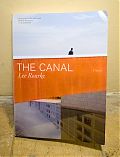
Lee Rourke
The Canal
The Canal is a short novel about an idea, or rather, it is a series of ideas rolled off a single word: boredom. For this reason, I neither disliked nor liked the book. I was left feeling as indifferent as the nameless narrator and his nameless neighbor on the bench; it beaded off me like the canal’s murky water beads off a swan’s back.
Perhaps the indifference I felt came mostly from the dull distancing that must have been purposely employed by Lee Rourke. The narrator is full of “it seems” and “I think” and “I suppose,” which has an effect of loosening the text and pushing me away from it. The Canal is not a vague novel, yet there is a vagueness in its telling that I found slightly irritating. It’s as if the narrator does not want to own his story; his being nameless is ambiguous enough.
But with that said, the premise of The Canal is interesting. A man quits his job and begins walking to a bench on the Regent’s canal everyday. He befriends a woman who eventually joins him on the bench. Gradually she tells him her “secret” in long conversations. We never know what this woman thinks, though through her conversation she betrays an even greater indifference to life than the narrator. She is all cold all around, bringing the narrator into her coldness by his attraction to her.
It is boredom which compels the narrator to the bench everyday. It is the acceptance of his boredom which allows him to sit there for hours, staring straight ahead. He observes the planes, the whitewashed office building, some office workers and the birds, the swans, the Canada geese and the coots—the most poetic passages in the book—he does nothing at all. The events that happen, happen around him and to him but he himself does little.
Everything about the narrator’s life and other’s lives can be attributed to boredom. The gang of youths prowl the canal because they’re bored, the woman commited a serious moral crime because she was bored, terrorists flew planes into skyscrapers because they were bored, people watch TV because they’re bored. The narrator reminded me of Akaky Akakeivich before his overcoat : the world is summed up loosely, without a need for understanding, without any personal meaning.
I had wanted to read The Canal because I noticed Lee Rourke’s website and noticed that The Canal received lots of praise. The Guardian has called Rourke a “leading light” on the short cover blurb and perhaps one day he will be.
Commentary for The Canal
Averill, thanks for the contrasting opinion about The Canal. I really wish I could have liked it, I wanted to like it before I began and while I was reading. I certainly know what you mean about the insistent boredom—in my 2nd to last paragraph I listed some things people in the book did out of boredom, which to me, seem possible only through varied and inexplicable motivations… I think it would be extremely difficult to pull a believable book off that narrowed every major action down to a single feeling.
· · · · · · · · · · · · · · · · · · · ·
1 On Thursday 13 January 2011 Averill Buchanan wrote:
While I actually did like this book, for me it had one big flaw: namely, that it wasn’t subtle enough about its treatment of boredom. It kept insisting on being about boredom (by telling us) rather than allowing us to feel that (if indeed we do) for ourselves.
I wasn’t convinced that the narrator (or his friend) were at the canal out of boredom or led boring lives, and I kept thinking that I must be missing something because the blurb and text itself are so insistent about it. I kept waiting for the novel to “show” me boredom and I was disappointed.